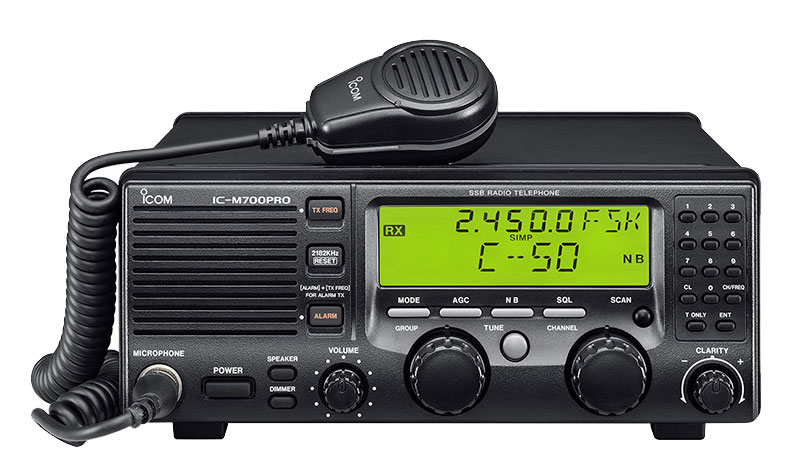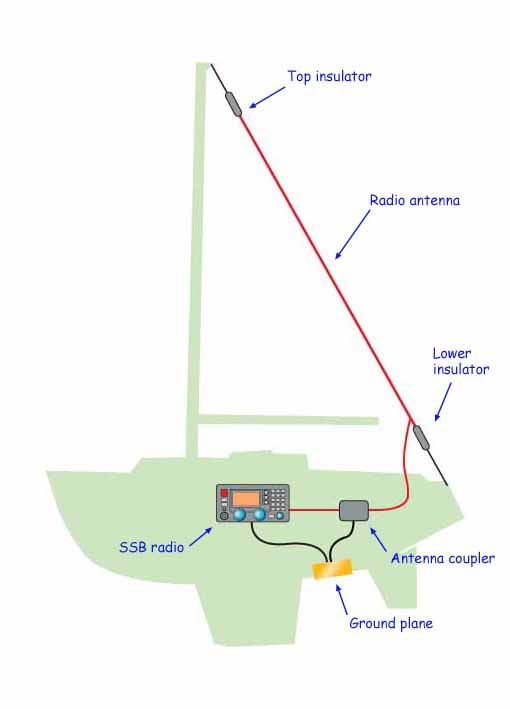- Home
- Electronics & Instrumentation
- SSB Marine Radio
Is an SSB Marine Radio
Right for Your Boat?
SSB marine radio is the bluewater sailors' favourite method of long-range communication. Once you've got the equipment installed—sadly not an inconsequential investment—all calls are free.
 A marine SSB radio—but is it the right choice for your vessel?
A marine SSB radio—but is it the right choice for your vessel?The Basics: What Sets SSB Apart?
SSB (Single Sideband) radio boasts a much greater range than a VHF (Very High Frequency) radio's typical 35 to 50 nautical miles. Medium Frequency (MF) SSB radios extend up to 400 nautical miles, while High Frequency (HF) can span several thousand.
Clearly, achieving this range requires more power—SSB marine radio sets typically draw a peak current of around 25A when transmitting. For boatowners venturing far beyond coastal waters, this capability makes SSB an indispensable tool.
The SSB Marine Radio Installation
A complete SSB radio setup involves several key components, each crucial for optimal performance:
 The components of an SSB radio installation
The components of an SSB radio installation- MF/HF SSB Transceiver: Some models allow transmission and reception on both HAM and marine frequencies. If you’re considering a HAM Radio License, investing in one of these sets could be a savvy choice.
- Antenna: Sailboats typically use an insulated backstay, while catamarans may opt for fiberglass whip antennas. However, a good ground plane is vital for signal quality—without it, reception will be poor.
- Ground Plane: Options include bronze thru-hulls bonded with copper strapping or a sintered bronze grounding shoe beneath the hull to avoid electrolysis problems. Steel-hulled boats, naturally, provide the best ground plane.
- Automatic Antenna Tuner: This ensures optimal performance across the wide frequency range of SSB radios. While manual tuners are cheaper, they require constant adjustment, making them less user-friendly.
Modern top-of-the-line SSB radios come equipped with DSC(Digital Selective Calling) functionality. However, for full marine MF/HF/VHF transmission capabilities, a GMDSS Long Range Certificate is required.
Once interfaced with a GPS and a laptop, your SSB radio opens the door to additional features like weatherfax downloads and email communication.
Expanding Your Horizons: Licensing Requirements
Before you set sail with your SSB radio, there are licensing requirements to consider. In the UK, for instance, you'll need a Ship Station License and a Long Range Certificate (LRC).
These certifications ensure operators understand key protocols, contributing to safer and more effective communication. Similarly, in the US, a Restricted Radiotelephone Operator Permit is necessary for recreational vessels.
Licensing is typically straightforward, involving online applications or short courses—helping you comply with regulations with ease.
SSB as a Safety Lifeline
Beyond communication, SSB radios serve a critical role in offshore safety. They provide access to Global Maritime Distress and Safety System (GMDSS) frequencies, which are essential for distress signals and rescue coordination.
Unlike satellite phones, SSB radios can broadcast distress calls to multiple listeners, increasing the chances of nearby vessels offering assistance—a reassuring feature for sailors venturing far from shore.
Building Community on the High Seas
SSB radios also connect sailors in ways that satellite communication systems cannot. Events like the Baja Ha-Ha and Atlantic Rally for Cruisers utilize SSB networks for daily updates, creating a shared experience among participants.
Stories from these networks often become cherished memories, transforming solo adventures into communal journeys.
Making It Modern: Technical Advancements
Today’s SSB radios have seen significant upgrades, from compatibility with amateur radio frequencies to enhanced DSC features for automated distress calls. These advancements make SSB radios not just a tool, but a versatile companion for modern sailors.
Weatherfax & Email: Staying Connected
SSB radios are more than communication devices—they’re gateways to crucial information. Weatherfax software, such as Mscan Meteo, allows sailors to download meteorological maps specific to their area. With over 90 weather stations worldwide broadcasting on HF SSB frequencies, staying ahead of the weather becomes simpler and safer.
Adding a radio modem enables email functionality, letting sailors send and receive messages even in remote locations. Services like www.sailmail.com charge a flat annual subscription, offering predictable costs and invaluable connectivity. For licensed HAM operators, Winlink 2000 provides free email services, albeit with restrictions on business usage.
Weighing the Costs
Installing an SSB radio setup is an investment. Expect to spend between $2,500 and $4,000 on equipment, installation, and accessories like antenna tuners.
Subscription fees for email services like SailMail add to the total, but understanding these costs upfront helps you weigh the long-term savings against satellite communication alternatives.
Comparing Alternatives
Satellite phones might seem like the obvious choice for global communication, but SSB radios have their unique advantages. While satellites offer ease of use and coverage, they lack the community-building and broadcast capabilities of SSB radios.
The following side-by-side comparison highlights the strengths and weaknesses of each system, helping sailors choose the best option for their needs.
Feature
SSB Radio
Satellite Phone
Cost
Initial setup costs range from $2,500 to $4,000, including equipment and installation.
Lower upfront cost, typically around $1,000, but requires a subscription.
Coverage
Limited by atmospheric conditions; HF signals can reach thousands of miles.
Global coverage, unaffected by weather or time of day.
Ease of Use
Requires knowledge of frequencies and tuning; setup is complex.
User-friendly; operates like a mobile phone.
Emergency Use
Broadcasts distress signals to multiple listeners; supports DSC.
Point-to-point communication; relies on private rescue services.
Community Engagement
Connects cruisers through regional nets and events.
No community-building features.
Data Transmission
Supports weatherfax and email with limitations.
Allows email, text, and limited web browsing.
Power Consumption
High power draw (up to 25A when transmitting).
Low power draw (<1A when charging).
Portability
Fixed installation.
Portable; can be used ashore or during evacuation.
Privacy
Limited privacy; broadcasts can be intercepted.
High privacy; point-to-point communication.
Eco-Friendly Grounding Options
For environmentally conscious sailors, alternatives to traditional bronze thru-hulls are worth considering. Sintered bronze grounding shoes or internal copper grounding systems reduce maintenance issues and avoid electrolysis problems, promoting sustainability while maintaining signal quality.
Maintaining Your Investment
Proper maintenance keeps your SSB equipment running smoothly. Regularly check all connections, clean your antenna, and ensure software updates are installed.
Troubleshooting issues like interference can save you headaches and ensure clear communication when it matters most.
Closing Thoughts
SSB marine radios are more than tools—they’re lifelines, community-builders, and gateways to the information that keeps sailors safe and connected.
By understanding licensing requirements, exploring new features, and considering the costs and maintenance tips, you can decide whether SSB is the right choice for your vessel.
Got any SSB-related questions that haven't been addressed in this article?
Recent Articles
-
Dufour 470 Review: Specs, Ratios & Expert Performance Analysis
Feb 12, 26 11:25 AM
An in-depth review of the Dufour 470 sailboat. Explore technical specifications, design ratios, and cruising characteristics of this versatile Umberto Felci design. -
Island Packet 40 Review: Specs, Performance & Cruising Analysis
Feb 09, 26 05:05 AM
An in-depth review of the Island Packet 40 sailboat. Explore technical specifications, design ratios, and real-world cruising performance for this legendary blue-water cruiser. -
Beneteau Oceanis 331 Clipper Review: Specs, Performance & Ratios
Feb 04, 26 07:25 PM
A comprehensive review of the Beneteau Oceanis 331 Clipper sailboat. We analyse design ratios, interior layout, and performance for prospective cruising owners.